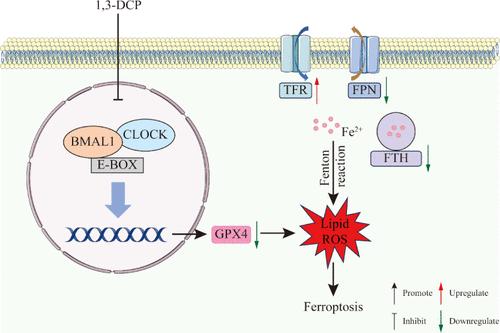当前位置:
X-MOL 学术
›
J. Agric. Food Chem.
›
论文详情
Our official English website, www.x-mol.net, welcomes your
feedback! (Note: you will need to create a separate account there.)
1,3-Dichloro-2-propanol Induced Renal Cell Ferroptosis via the Circadian Clock Protein BMAL1 Targeting GPX4
Journal of Agricultural and Food Chemistry ( IF 5.7 ) Pub Date : 2024-11-19 , DOI: 10.1021/acs.jafc.4c05676 Yuelin Chen, Shuang Guan, Meitong Liu, Lingxi Lang, Huanhuan Peng, Jing Lu
Journal of Agricultural and Food Chemistry ( IF 5.7 ) Pub Date : 2024-11-19 , DOI: 10.1021/acs.jafc.4c05676 Yuelin Chen, Shuang Guan, Meitong Liu, Lingxi Lang, Huanhuan Peng, Jing Lu

|
1,3-Dichloro-2-propanol (1,3-DCP), a representative chloropropyl alcohol contaminant in food, has shown toxic effects on the kidney. Ferroptosis is a newly identified cell death driven by iron-dependent lipid peroxidation that is associated with renal injury. However, the role of 1,3-DCP in ferroptosis in renal cells remains unclear. In this study, we found that ferroptosis was involved in a 1,3-DCP-induced renal injury. Mechanistically, we revealed that 1,3-DCP triggered ferroptosis by inhibiting GPX4 activity and disturbing iron homeostasis in NRK-52E cells. The circadian clock is crucial in modulating physiological cellular functions through the regulation of various downstream proteins. Furthermore, our findings also showed that 1,3-DCP triggered ferroptosis through interference with the circadian clock. The data showed that the expression of GPX4 was regulated by clock core protein BMAL1. 1,3-DCP interfered with GPX4 rhythmic expression through disordering BMAL1 and led to lipid peroxidation, ultimately inducing ferroptosis. In conclusion, our study uncovered that BMAL1 was responsible for controlling GPX4 to mediate 1,3-DCP-induced ferroptosis. The BMAL1/GPX4 axis may be a potentially novel pathway for ferroptosis. Our work may offer a fresh perspective for toxicological research examining the interactions between food pollutants, circadian clock, and ferroptosis.
中文翻译:

1,3-二氯-2-丙醇通过靶向 GPX4 的生物钟蛋白 BMAL1 诱导肾细胞铁死亡
1,3-二氯-2-丙醇 (1,3-DCP) 是食品中代表性的氯丙醇污染物,已显示出对肾脏的毒性作用。铁死亡是一种新发现的细胞死亡,由与肾损伤相关的铁依赖性脂质过氧化驱动。然而,1,3-DCP 在肾细胞铁死亡中的作用仍不清楚。在这项研究中,我们发现铁死亡与 1,3-DCP 诱导的肾损伤有关。从机制上讲,我们揭示了 1,3-DCP 通过抑制 GPX4 活性和干扰 NRK-52E 细胞中的铁稳态来触发铁死亡。生物钟在通过调节各种下游蛋白质来调节生理细胞功能中至关重要。此外,我们的研究结果还表明,1,3-DCP 通过干扰昼夜节律时钟触发铁死亡。数据显示,GPX4 的表达受时钟核心蛋白 BMAL1 的调控。1,3-DCP 通过紊乱 BMAL1 干扰 GPX4 节律性表达,导致脂质过氧化,最终诱导铁死亡。总之,我们的研究发现 BMAL1 负责控制 GPX4 介导 1,3-DCP 诱导的铁死亡。BMAL1/GPX4 轴可能是铁死亡的潜在新途径。我们的工作可能为研究食物污染物、生物钟和铁死亡之间相互作用的毒理学研究提供新的视角。
更新日期:2024-11-20
中文翻译:

1,3-二氯-2-丙醇通过靶向 GPX4 的生物钟蛋白 BMAL1 诱导肾细胞铁死亡
1,3-二氯-2-丙醇 (1,3-DCP) 是食品中代表性的氯丙醇污染物,已显示出对肾脏的毒性作用。铁死亡是一种新发现的细胞死亡,由与肾损伤相关的铁依赖性脂质过氧化驱动。然而,1,3-DCP 在肾细胞铁死亡中的作用仍不清楚。在这项研究中,我们发现铁死亡与 1,3-DCP 诱导的肾损伤有关。从机制上讲,我们揭示了 1,3-DCP 通过抑制 GPX4 活性和干扰 NRK-52E 细胞中的铁稳态来触发铁死亡。生物钟在通过调节各种下游蛋白质来调节生理细胞功能中至关重要。此外,我们的研究结果还表明,1,3-DCP 通过干扰昼夜节律时钟触发铁死亡。数据显示,GPX4 的表达受时钟核心蛋白 BMAL1 的调控。1,3-DCP 通过紊乱 BMAL1 干扰 GPX4 节律性表达,导致脂质过氧化,最终诱导铁死亡。总之,我们的研究发现 BMAL1 负责控制 GPX4 介导 1,3-DCP 诱导的铁死亡。BMAL1/GPX4 轴可能是铁死亡的潜在新途径。我们的工作可能为研究食物污染物、生物钟和铁死亡之间相互作用的毒理学研究提供新的视角。


















































 京公网安备 11010802027423号
京公网安备 11010802027423号